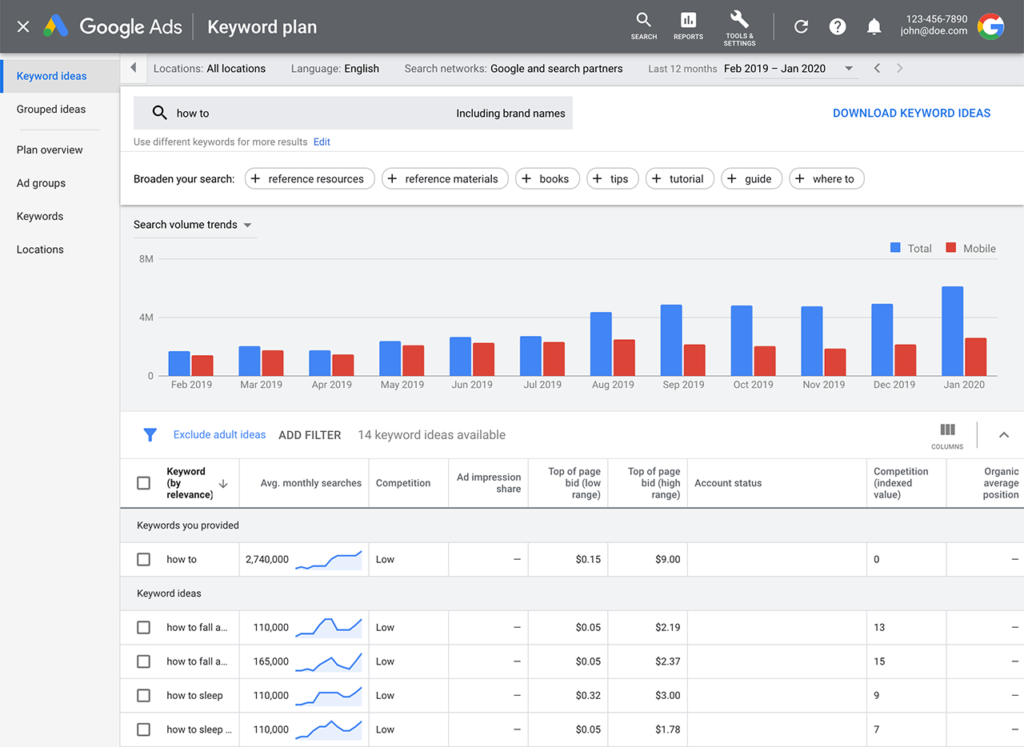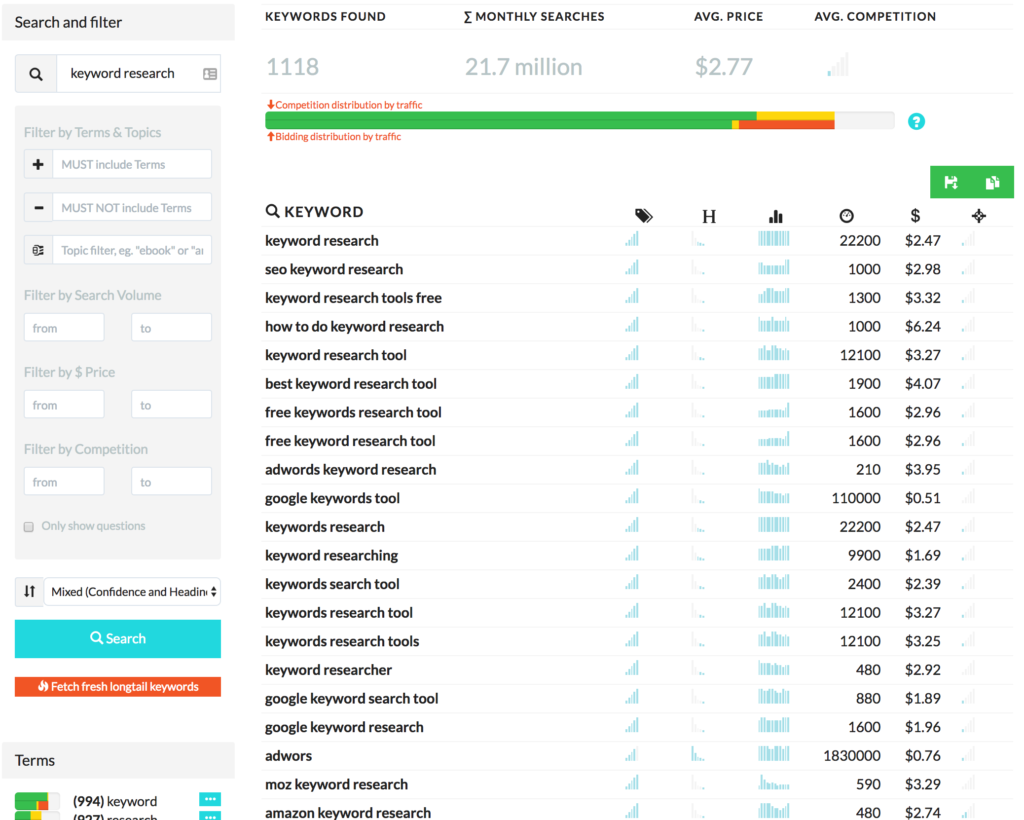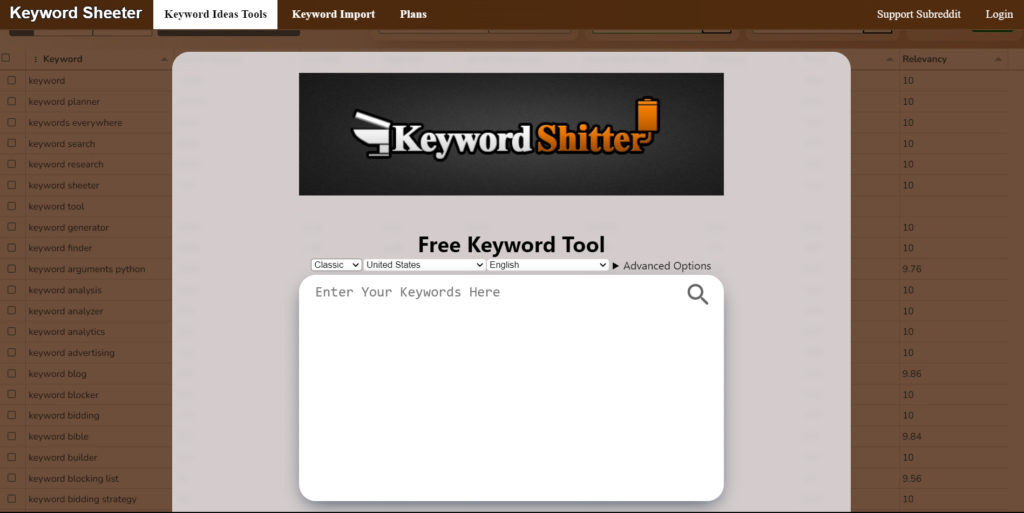

As a content creator or a business owner, targeting the right keywords is critical to the success of your website. The use of keyword tools can help you uncover the most relevant search terms for your niche, giving you a competitive edge. In this article, we’ll explore the top free keyword tools available, outlining their pros and cons so you can choose the best one for your needs.
Table of Contents
Google Keyword Planner
Pros:
- Provided by Google, the most popular search engine, ensuring accurate and reliable data.
- Offers search volume and competition data, making it easy to determine which keywords to target.
- Allows you to analyze trends and compare keyword performance over time.
Cons:
- Limited to Google data, meaning it may not provide information on other search engines.
- Requires a Google Ads account to access, which can be a drawback for some users.
Ubersuggest

Pros:
- User-friendly interface and easy to use, making it suitable for beginners.
- Provides keyword suggestions, search volume, and competition data.
- Offers content ideas and backlink analysis, useful for overall SEO strategy.
Cons:
- Limited daily searches in the free version, which can be restrictive for heavy users.
- Some features require a paid subscription for full access.
Answer The Public

Pros:
- Generates keyword ideas based on questions people are asking about a specific topic.
- Provides a visual representation of the data, making it easy to identify patterns and trends.
- Offers a unique approach to keyword research, focusing on long-tail keywords and user intent.
Cons:
- Lacks search volume and competition data, making it less comprehensive than other tools.
- Limited to three daily searches in the free version.
Keyword Surfer

Pros:
- A browser extension for Google Chrome, making it easily accessible and convenient.
- Offers search volume, CPC, and competition data directly in Google search results.
- Provides related keywords and their search volumes, helpful for expanding your keyword list.
Cons:
- Limited to Google Chrome users.
- May not be as accurate or comprehensive as standalone keyword tools.
Keyword.io

Pros:
- Generates a large number of keyword suggestions based on your seed keyword.
- Offers search volume and competition data for Google, Bing, and other search engines.
- Supports multiple languages and regions, making it suitable for international SEO.
Cons:
- Free version only provides keyword suggestions, with search volume and competition data requiring a paid subscription.
- The user interface can be overwhelming for beginners.
Soovle

Pros:
- Aggregates data from multiple search engines, including Google, Bing, Yahoo, and more.
- Provides autocomplete suggestions, helping you discover long-tail keywords and related terms.
- Fast and easy to use, offering real-time keyword suggestions as you type.
Cons:
- Lacks search volume and competition data, requiring additional tools for a comprehensive analysis.
- The user interface may appear outdated compared to other modern tools.
Keywords Everywhere

Pros:
- A browser extension for both Google Chrome and Firefox, offering convenient keyword research.
- Displays search volume, CPC, and competition data directly within search engine results pages.
- Supports multiple search engines and websites, including Google, Bing, Amazon, and YouTube.
Cons:
- Free version only offers limited features, with search volume and competition data requiring a paid subscription.
- Limited to Google Chrome and Firefox users.
Keyword Sheeter

Pros:
- Generates a large number of keyword suggestions based on your seed keyword.
- Fast and efficient, offering thousands of keyword suggestions in just a few minutes.
- Provides a simple interface with easy-to-use filtering options for refining your keyword list.
Cons:
- Does not offer search volume or competition data, necessitating the use of other tools for a complete analysis.
- Some users may find the interface too minimalistic and lacking in features.
SEO Book Keyword Tool
Pros:
- Offers keyword suggestions, search volume, and competition data from various sources, including Google, Yahoo, and Bing.
- Provides additional information, such as daily search volume and cost per click (CPC), useful for PPC campaigns.
- Offers a free registration option, granting you access to additional SEO tools and resources.
Cons:
- Requires registration for access, which may be a drawback for some users.
- The user interface may appear less polished than other modern keyword tools.
Conclusion
While each of these free keyword tools has its unique advantages and drawbacks, the best overall option for most users is Google Keyword Planner. With its accurate and reliable data, search volume and competition information, and compatibility with Google Ads, it offers a comprehensive solution for keyword research. However, it is important to consider your specific needs and requirements, as the other tools mentioned may be more suitable depending on your situation. By combining the power of these free keyword tools, you can optimize your content and boost your website’s SEO performance.




